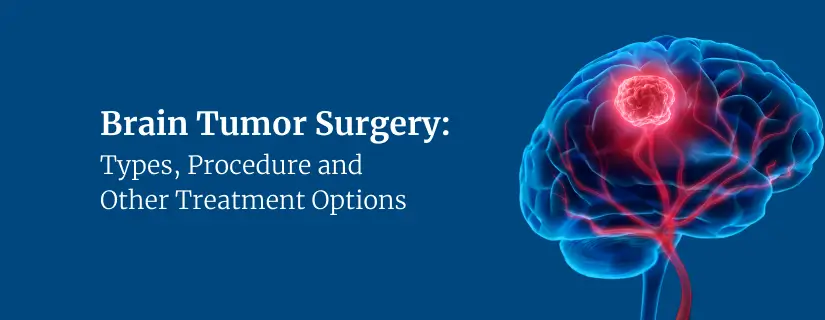-
Doctors
-
Specialities & Treatments
Centre of Excellence
Specialties
Treatments and Procedures
Hospitals & Directions HyderabadCARE Hospitals, Banjara Hills CARE Outpatient Centre, Banjara Hills CARE Hospitals, HITEC City CARE Hospitals, Nampally Gurunanak CARE Hospitals, Musheerabad CARE Hospitals Outpatient Centre, HITEC City CARE Hospitals, Malakpet
HyderabadCARE Hospitals, Banjara Hills CARE Outpatient Centre, Banjara Hills CARE Hospitals, HITEC City CARE Hospitals, Nampally Gurunanak CARE Hospitals, Musheerabad CARE Hospitals Outpatient Centre, HITEC City CARE Hospitals, Malakpet Raipur
Raipur
 Bhubaneswar
Bhubaneswar Visakhapatnam
Visakhapatnam
 Nagpur
Nagpur
 Indore
Indore
 Chh. Sambhajinagar
Chh. SambhajinagarClinics & Medical Centers
Book an AppointmentContact Us
Online Lab Reports
Book an Appointment
Consult Super-Specialist Doctors at CARE Hospitals
Brain Tumor Surgery: Types, Procedure and Other Treatment Options
Updated on 9 July 2024

Brain tumours, whether benign or malignant, pose a significant threat to an individual's health and well-being. While the mere thought of undergoing brain surgery can be daunting, advancements in surgical technology and surgical techniques have made brain tumour surgery a life-saving procedure. Let's understand the intricacies of brain tumour surgery, shedding light on its types, diagnosis, treatment options, and the crucial steps involved in the surgical process.
Types of Brain Tumor Surgery
Brain tumour surgery is of two main categories:
- Craniotomy: This is the most common type of brain tumour surgery. In this procedure, a portion of the patient's skull is temporarily removed to access the tumour. The surgeon then carefully removes the tumour while trying to preserve as much healthy brain tissue as possible.
- Minimally Invasive Brain Surgery: This approach involves using advanced imaging techniques and specialised instruments to access and remove the tumour through a small opening in the skull. It is often preferred for tumours located in deep or sensitive brain areas.
Signs and Symptoms of a Brain Tumour
Early detection with prompt and proper treatment is crucial in managing brain tumours effectively. Some common signs and symptoms to watch out for include:
- Persistent headaches
- Seizures
- Vision issues include but are not limited to double vision, blurred vision, or peripheral vision loss.
- Personality changes, mood swings, or unusual behaviour
- Loss of balance or coordination
- Hearing issues, ringing in the ears, or hearing loss
- Nausea and vomiting
- Speech difficulties, trouble finding words, or understanding language
- Memory problems, difficulty concentrating, or confusion
Diagnosis of Brain Tumour
Diagnosing a brain tumour involves a combination of the following:
- Medical History and Physical Examination: The treating doctor will take in-depth information about the symptoms and perform a comprehensive physical examination.
- Blood Tests: Doctors may prescribe blood tests to detect markers suggesting cancer or other conditions.
- Imaging Tests: Magnetic Resonance Imaging (MRI), Computed Tomography (CT) scans, or PET scans provide detailed brain images, enabling doctors to detect and locate tumours and the extent of their spread in nearby or distant tissues.
- Biopsy: Sometimes, a small tumour sample may be taken by a procedure called biopsy. This sample is examined under a microscope to interpret the type and grade of tumour.
- Lumbar Puncture: Doctors may conduct a lumbar puncture (spinal tap) to collect cerebrospinal fluid from the lower spine to check for cancer cells or biomarkers indicating a tumour.
- Neurological Examination: Doctors may perform neurological evaluations to assess various functions, such as vision, hearing, balance, coordination, reflexes, and motor skills, to determine which part of the brain might be affected.
Brain Tumor Treatment
Treatment modalities for brain tumours depend on various factors, including the tumour's type, size, location, and the patient's overall health. The two main approaches are:
- Surgery:
- The objective of the Brain tumour surgery is to remove as much part of the tumour as possible while minimising damage to surrounding healthy brain tissue. The extent of the surgery depends on the tumour's location and proximity to critical brain structures.
- Brain Tumor Treatment without Surgery:
- In some cases, surgery may not be recommended or may be combined with other treatment options, such as:
- Radiation Therapy: High-energy radiation to shrink or destroy the tumour cells
- Chemotherapy: Specialised chemo drugs target and kill cancer cells
- Targeted Therapy: These treatments target the specific molecules in tumour growth and progression.
- In some cases, surgery may not be recommended or may be combined with other treatment options, such as:
Brain Tumor Surgery Procedure
- Before Brain Tumor Treatment Surgery
- Preparation for brain tumour surgery involves several steps:
- Pre-operative Tests: Your oncology team will conduct various tests, like blood tests, imaging scans, or biopsy, to assess your overall health and plan the surgery.
- Medication Instructions: Doctors will advise you to stop taking certain medications before the surgery to minimise risks.
- Fasting: Your doctor will ask you to stop taking food and liquids for a specific period before the surgery.
- Informed Consent: This surgeon will explain the procedure, potential risks, and benefits and take the consent.
- During Brain Tumor Surgery
- The surgical procedure for brain tumour removal typically involves the following steps:
- Anaesthesia: The surgical staff will administer general anaesthesia to ensure you remain unconscious and pain-free throughout the surgery.
- Surgical Approach: Depending on the tumour's location, your surgeon will choose the appropriate surgical approach, such as a craniotomy or a minimally invasive technique.
- Tumour Removal: The surgeon will carefully remove the tumour while preserving as much healthy brain tissue as possible using specialised surgical instruments and advanced imaging guidance.
- Closure: After the brain tumour removal, the surgical area will be closed, and the skull bone (if removed) will be replaced or secured with a synthetic material.
- After Brain Tumor Surgery
- The recovery process after brain tumour surgery varies depending on the type of procedure and the individual's overall health. Here are some common steps:
- Intensive Care Unit (ICU): You will be closely monitored in the ICU for several days to ensure your vital signs (BP, heart rate, respiration, and urinary output) are stable and to manage any potential complications.
- Pain Management: Your medical team will provide medicines to manage postoperative pain and discomfort.
- Rehabilitation: Depending on the site and extent of the surgery, you may require physical, occupational, or speech therapy to regain strength, mobility, and cognitive function.
- Follow-up Care: Your surgeon will schedule regular follow-up appointments to monitor the recovery and discuss any additional treatment options, if necessary.
Risks of Brain Tumor Surgery
Like any surgical procedure, brain tumour surgery carries certain risks. These may include:
- Bleeding in the brain, which may lead to complications such as stroke or hematoma
- Infection at the incision site or within the brain
- Blood clots
- Postoperative brain swelling can increase intracranial pressure
- Stroke during or after surgery due to potential damage to blood vessels in the brain
- Seizures
- Cerebrospinal fluid leakage, causing headaches or increasing the risk of infection
- Neurological deficits, such as such as weakness, numbness, difficulty speaking, or vision problems
- Cognitive alterations, such as memory loss, difficulty concentrating, confusion, impaired judgment, and problems with problem-solving skills
- Coma or brain damage
- Functional impairments affecting movement, sensation, language, or other motor and sensory functions
Prevention
While there is no guaranteed way to prevent brain tumours, adopting a healthy lifestyle can potentially reduce the risk. The following are some preventive measures:
- Maintaining a balanced meal plan rich in fruits and vegetables
- Regular physical activity
- Avoiding excessive exposure to ionising radiation
- Protecting your head from traumatic injuries
- Avoid smoking and alcohol consumption
- Limit exposure to harmful chemicals and pollutants
- If you have a family history of brain tumours, discuss it with your doctor for screening
When to See a Doctor
If you experience any persistent or worsening symptoms that may indicate a brain tumour, it is crucial to seek medical attention promptly. Early diagnosis with correct treatment can improve the chances of a successful outcome.
FAQs
1. Is brain tumour surgery safe?
Brain tumour surgery is a complex procedure, but advancements in technology have made it safer than ever before. However, like any surgery, it carries potential risks that your surgeon will discuss with you in detail.
2. How long does it take to recover?
Recovery time differs and depends on the extent of the surgery, the tumour's location, and the individual's overall health. Some patients may recover within a span of few weeks, while others may require several months.
3. What to avoid after brain surgery?
After brain surgery, following your doctor's instructions is essential. Generally, it would help if you avoid strenuous activities like heavy lifting or activities that could potentially cause head trauma or strain.
4. How should I prepare for the procedure of brain tumour surgery?
The doctor will instruct you on how to prepare for brain surgery. These may include fasting, stopping certain medications, arranging transportation, and discussing any concerns about the procedure with your doctor.
5. What happens after a brain tumour is removed?
After a huge brain tumour removal, your medical team will closely monitor you in the intensive care unit (ICU) for several days. Depending on the extent of the surgery and your recovery progress, you may require rehabilitation, follow-up treatments, or additional procedures.
ENQUIRY FORM
SELECT CATEGORIES
-
Neurosciences (16)
-
Neurology (37)
-
Neurosurgery (14)
-
Orthopaedics (48)
-
Oncology (33)
-
Obstetrics and gynecology (51)
-
Pulmonology (23)
-
Urology (20)
-
Nephrology (13)
-
Psychiatry (7)
-
Dietetics and Nutrition (111)
-
General Medicine (63)
-
Cardiac Sciences (30)
-
Vascular & Endovascular Surgery and Interventional Radiology (10)
-
Gastroenterology (46)
-
Endocrinology (23)
-
Plastic Surgery (10)
-
Critical Care Medicine (5)
-
COVID-19 (16)
-
Dermatology (16)
-
Emergency Care (1)
-
Ophthalmology (4)
-
Pediatrics (14)
-
Laparoscopic and Bariatric Surgery (8)
-
ENT (15)
-
Kidney Transplant (1)
-
Liver Transplantation and Hepatobiliary Surgery (5)
-
General Surgery (3)
-
Internal Medicine (5)
-
Medicine Information
Sciatica Surgery: Types, Procedure, Risks and More
Traumatic Brain Injury: Types, Symptoms, Causes and Treatment
YOU MAY ALSO LIKE
RECENT BLOGS
-

Direct Anterior Approach in Total Hip Replacement: Advantages and Challenges
10 April 2025
Read More
-

Zinc Deficiency: Signs and Symptoms, Causes, Treatment
9 April 2025
Read More
-

Chest Pain When Coughing: Causes, Treatment and Home Remedies
9 April 2025
Read More
-

12 Health Benefits of Eating Mushrooms
8 April 2025
Read More
-

7 Health Benefits of Blood Donation You Should Know About
8 April 2025
Read More
-

Implantation Bleeding Vs Periods: Know the Difference
28 February 2025
Read More
-

Bloating During Ovulation: Symptoms, Causes and Remedies
28 February 2025
Read More
-

Itching During Dengue: Causes, Treatment and Home Remedies
18 February 2025
Read More
Have a Question?
If you cannot find answers to your queries, please fill out the enquiry form or call the number below. We will contact you shortly.













